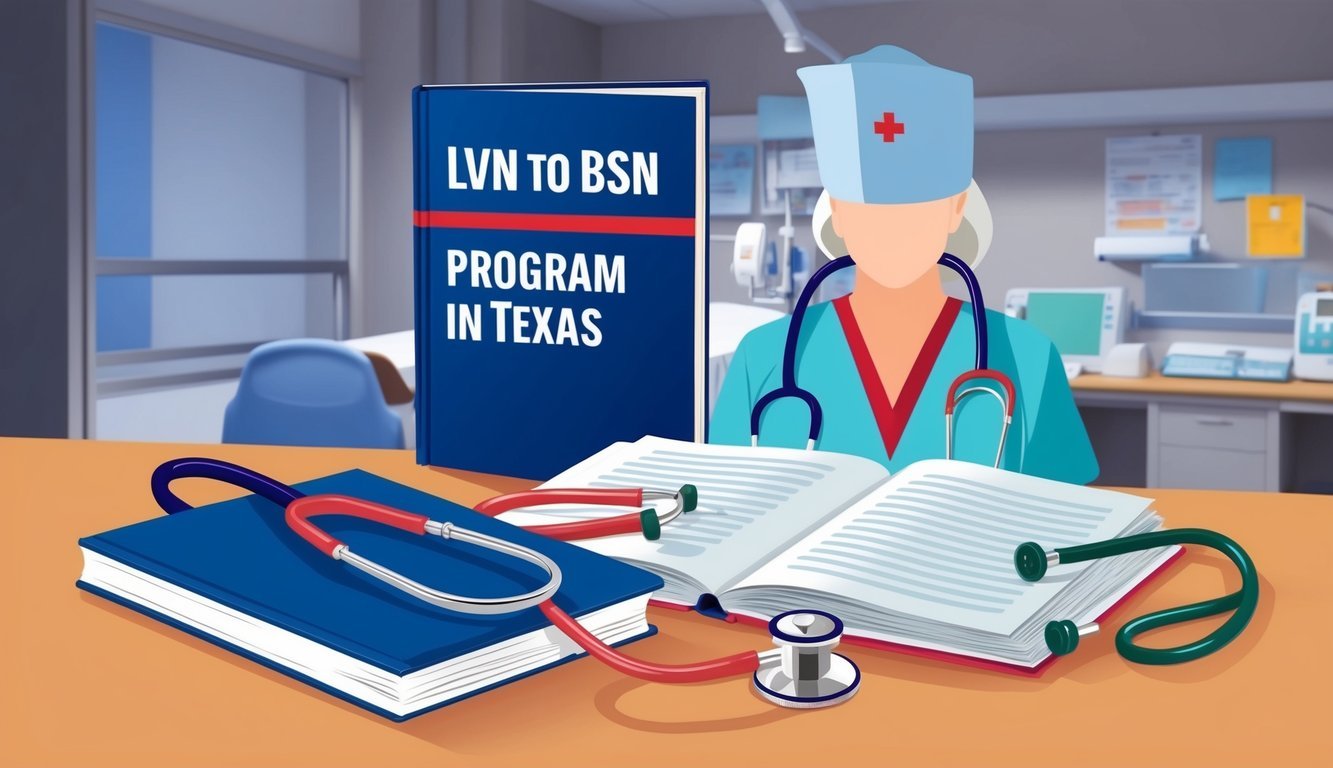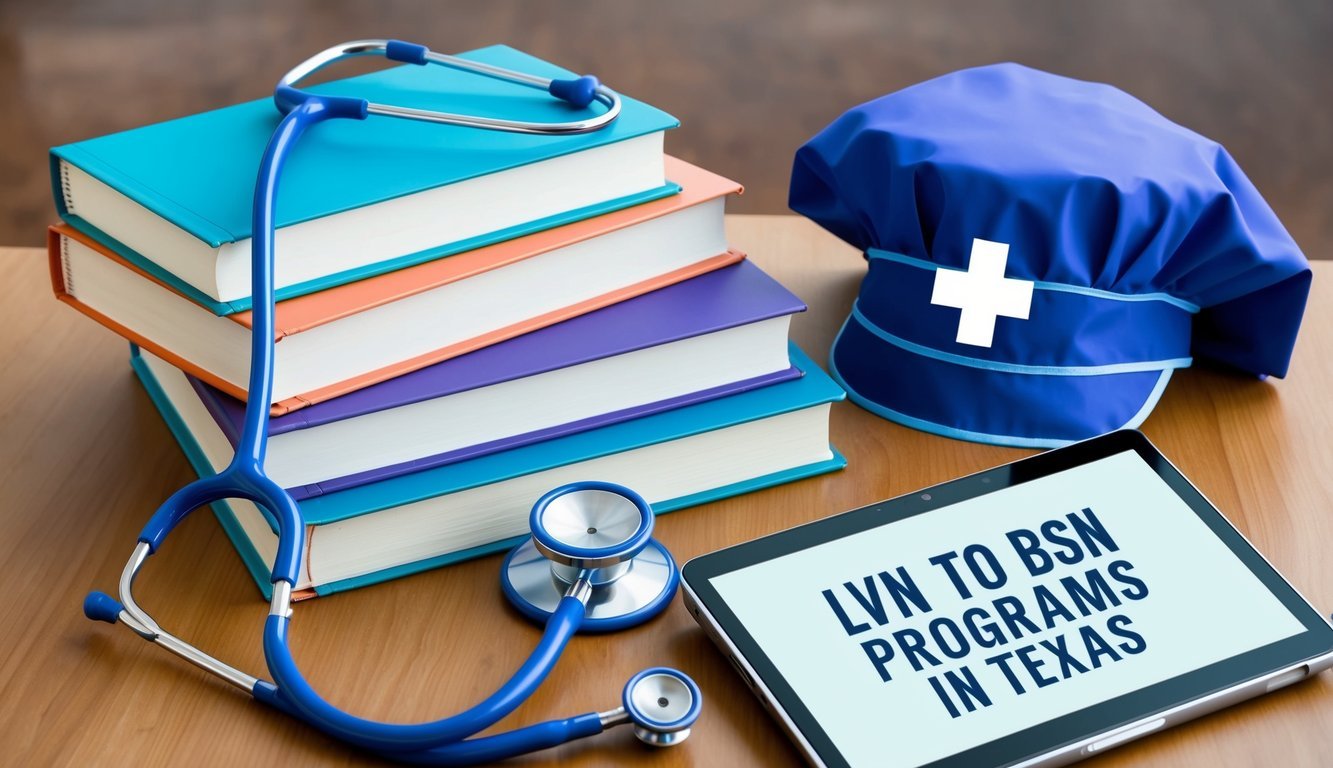LVN to BSN programs in Texas offer a vital pathway for Licensed Vocational Nurses looking to advance their careers. These programs allow you to earn a Bachelor of Science in Nursing, boosting your skills and marketability in a competitive healthcare environment. With growing demands for more educated nursing professionals, now is a great time to consider making the transition.
As you explore your options, understanding the admission requirements, curriculum, and institutions offering these programs can empower you to make informed decisions.
Many universities in Texas facilitate this transition, providing the support you need throughout your educational journey.
You can also take advantage of various resources designed to help you succeed.
Key Takeaways
- LVN to BSN programs enhance your nursing qualifications.
- Admission criteria vary among institutions, so research is key.
- Many Texas universities offer tailored support for aspiring BSN students.
Understanding LVN to BSN Programs in Texas

LVN to BSN programs provide an important pathway for Licensed Vocational Nurses (LVNs) to advance their careers.
These programs help you transition from an LVN to a Registered Nurse (RN) with a Bachelor of Science in Nursing (BSN).
Below are key areas to consider as you navigate this educational journey.
The Role of BSN in Nursing Practice
A Bachelor of Science in Nursing (BSN) plays a critical role in modern nursing.
With a BSN, you gain a deeper understanding of nursing theory, leadership, and research.
This education prepares you for a variety of roles in healthcare settings.
Many employers prefer RNs with a BSN for their advanced knowledge and skills.
In Texas, RNs with a BSN can also apply for management positions or specialize in areas like critical care or pediatrics.
A BSN is often seen as a stepping stone for further education, such as a Master’s degree.
Overview of LVN to BSN Transition
The LVN to BSN transition involves several steps.
First, you need to hold a valid LVN license.
Most programs recognize the experience you gained as an LVN, offering advanced placement options.
This can shorten your time in school.
A typical program includes nursing core classes and clinical experience.
You can expect to complete around 121 credits, including nursing prerequisites.
Programs may take 2-4 years depending on whether you attend full-time or part-time.
Significance of Advancing from LVN to BSN
Advancing from an LVN to a BSN has significant benefits.
First, it can increase your salary potential.
For example, as of 2021, RNs in Texas made an average of $79,120 annually.
In comparison, LVNs tend to earn less, making this transition financially appealing.
Additionally, a BSN opens doors to diverse job opportunities.
With a BSN, you can work in specialized areas, take on leadership roles, or even teach nursing students.
Furthermore, many healthcare settings are moving toward requiring a BSN for new hires, making this qualification increasingly necessary.
For detailed information on specific programs, you can visit resources like NurseJournal and Practical Nursing.
Eligibility and Admission Requirements

To enroll in an LVN to BSN program in Texas, you must meet specific educational qualifications and demonstrate that you are a licensed vocational nurse.
You will also need to complete certain prerequisite courses and possess essential nursing skills.
Here are the key requirements.
Minimum Educational Qualifications
You must have at least a high school diploma or a General Educational Development (GED) certificate.
Many programs require you to have completed your LVN diploma.
In some cases, a minimum cumulative GPA of 3.0 is expected from your LVN program.
Additionally, your LVN program should be from an accredited institution to ensure that the quality of education meets state standards.
Make sure to check with individual programs for any additional academic requirements they might have.
LVN License Verification
You must hold a valid and unrestricted LVN license in Texas before applying to a BSN program.
This license is critical, as it demonstrates your qualifications and competency in nursing practice.
Some programs may require you to submit a copy of your license as part of the application process.
Ensure your license is current and in good standing, as any disciplinary actions could impact your eligibility.
Prerequisite Coursework and Skills
Before entering an LVN to BSN program, you must complete certain prerequisite courses.
Common courses include:
- Biology
- Chemistry
- Human Anatomy and Physiology
- Nutrition
You may also need to demonstrate various nursing skills such as patient care techniques, medication administration, and communication skills.
These competencies are essential for success in a BSN program and your future nursing career.
Additionally, gather letters of recommendation, as some programs may ask for these to assess your character and dedication to nursing.
Meeting these requirements will prepare you for a successful transition into the BSN program.
Program Curriculum and Clinical Experience

The curriculum for LVN to BSN programs in Texas is designed to build on your existing nursing knowledge while preparing you for broader clinical roles.
This includes essential nursing courses along with significant hands-on experiences.
Core Nursing Courses and Specializations
In your LVN to BSN program, you’ll encounter a variety of core nursing courses.
These typically include:
- Health Assessment: Learn to evaluate patient health and implement appropriate care plans.
- Pathophysiology: Understand disease processes to better manage patient care.
- Pharmacology: Study medication management, focusing on safe administration and patient education.
Programs may also offer specializations to match your interests, such as pediatrics or gerontology.
Credit hours for these core courses usually amount to 62 hours, forming a solid foundation for advanced clinical practice.
Clinical Practicums and Fieldwork
Clinical experience is a vital part of the LVN to BSN curriculum.
During your training, you’ll engage in multiple clinical practicums, allowing you to apply classroom knowledge in real-life settings.
These experiences involve:
- Working in various healthcare environments, such as hospitals or community clinics.
- Collaborating with experienced nurses to enhance your skills.
Typically, the program requires a significant number of clinical hours, roughly 500 or more, to ensure you are well-prepared for your nursing career.
This hands-on training is crucial for building your confidence and competence in patient care.
By combining theory with extensive practice, you can become a proficient and well-rounded nurse.
For more information about specific programs, you may visit EduMed.org.
Key Institutions Offering LVN to BSN in Texas

Several institutions in Texas provide quality LVN to BSN programs. These programs are designed to help licensed vocational nurses advance their education and career opportunities.
Here are some of the key options available to you.
Sam Houston State University’s Nursing Program
Sam Houston State University (SHSU) offers a robust LVN to BSN program through its School of Nursing.
This program is designed for licensed vocational nurses who wish to obtain a Bachelor of Science in Nursing.
Key Features:
- Duration: This program can typically be completed in about 4 semesters.
- Location: The program is available on campus at The Woodlands, allowing for hands-on learning.
- Curriculum: Students complete essential nursing courses and gain practical experience through clinical rotations.
- Accreditation: SHSU is accredited by the Texas Board of Nursing, ensuring credibility and recognition.
With a focus on comprehensive patient care, this program equips you with vital skills needed in today’s healthcare environment.
McLennan Community College’s BSN Track
McLennan Community College (MCC) also provides a pathway from LVN to BSN.
Their program aims to create knowledgeable and skilled nursing professionals.
Key Features:
- Course Credits: You need to complete 121 credit hours, which include nursing fundamentals and core nursing classes.
- Duration: The total length of the program is about 4 years.
- Support Services: MCC offers academic advising and tutoring to help you succeed.
- Admissions Requirements: You must have a high school diploma or GED and a valid LVN license, along with a minimum GPA.
MCC’s program is designed to fit the needs of aspiring nurses looking to enhance their career prospects and gain more advanced skills.
Supporting Your BSN Journey

Navigating the path to your BSN can be smoother with the right financial resources and flexible learning options.
Below are key areas that can significantly support your journey.
Financial Aid and Tuition Reimbursement
Financial aid can ease the burden of tuition costs.
Many programs offer various types of aid, including grants, scholarships, and loans.
For example, some schools provide specific scholarships for LVN-to-BSN students.
You should also explore tuition reimbursement programs offered by employers.
Many healthcare facilities support their staff in advancing education.
Check if your workplace has a reimbursement policy, which can help cover tuition costs at schools like Tarleton State University or Sam Houston State University.
Here’s a quick comparison of options:
| Type of Aid | Description |
|---|---|
| Grants | Money you do not have to repay. |
| Scholarships | Awarded based on various criteria. |
| Loans | Must be repaid with interest. |
| Tuition Reimbursement | Offered by employers for continued education. |
Online Programs and Flexible Learning Options
Many LVN-to-BSN programs now offer online courses.
This flexibility allows you to balance work and study more effectively.
You can find programs that let you take clinicals locally while completing coursework at your own pace.
Consider programs like those offered at EduMed.org.
They have options for both online and hybrid learning that can cater to your schedule and needs.
When evaluating programs, check for the following:
- Hybrid Options: Combines online learning with in-person clinical experiences.
- Asynchronous Learning: Complete coursework on your schedule.
- Accelerated Programs: Finish your degree faster if you have prior experience.
Explore these options to find a program that best fits your personal and professional responsibilities.
Frequently Asked Questions
This section addresses common queries regarding LVN to BSN programs in Texas.
You’ll find specific information about programming options, requirements, and the benefits of advancing your nursing career.
What are the top-rated LVN to BSN programs in Texas?
Some of the top-rated LVN to BSN programs in Texas include those offered by Sam Houston State University and other public universities.
These programs are recognized for their comprehensive curriculum and high graduation rates.
How long does it typically take to complete an LVN to BSN program in Texas?
Most LVN to BSN programs in Texas take approximately 12 to 18 months to complete.
The duration depends on the institution and your enrollment status.
Full-time students may finish faster than part-time students.
Can LVN to BSN programs in Texas be completed online, and if so, which institutions offer this option?
Yes, some LVN to BSN programs in Texas offer online options.
Institutions like the University of Texas at Arlington provide online pathways for LVNs pursuing a BSN.
What are the specific requirements for enrollment in an LVN to BSN program in the Houston area?
To enroll in an LVN to BSN program in the Houston area, you typically need a valid LVN license, a high school diploma or equivalent, and completion of prerequisite courses.
Make sure to check with specific programs for detailed criteria.
What are the advantages of obtaining a BSN over an LVN?
Obtaining a BSN can lead to higher salary potential and more job opportunities.
BSN graduates may also qualify for advanced positions and have a greater ability to focus on specialized areas of nursing.
Are there any accelerated LVN to BSN programs available in San Antonio, Texas?
Yes, several institutions in San Antonio offer accelerated LVN to BSN programs.
One of those is the University of Texas at San Antonio.
They provide an intensive curriculum for those looking to complete their BSN quickly.

